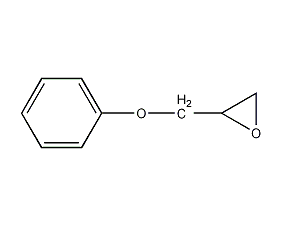
Structural formula
| Business number | 03F8 |
|---|---|
| Molecular formula | C9H10O2 |
| Molecular weight | 150.17 |
| label |
Phenylglycidyl ether, Glycidyl phenyl ether, phenyl glycidyl ether, Propylene oxide phenyl ether, Epoxypropyl phenyl ether, reactive diluent |
Numbering system
CAS number:122-60-1
MDL number:MFCD00005133
EINECS number:204-557-2
RTECS number:TZ3675000
BRN number:2744
PubChem number:24854931
Physical property data
1. Properties: Colorless transparent liquid
2. Relative density (kg/ml, 21℃): 1.1109
3. Refractive index (21℃): 1.5307
4. Flash point (℃): 110
5. Melting point (℃): 3.5
6 Boiling point (ºC, 100kpa): 243~425
7 Toxicity: Low toxicity
8 Water solubility: Easily soluble in ether and benzene, insoluble in water. Can evaporate with water vapor.
Toxicological data
- Toxicity Classification Poisoning
- Acute toxicity: Oral – Large Mouse LD50: 3850 mg/kg; Oral – Mouse LD50: 1400 mg/kg.
- Irritation Data: Dermal – Rabbit 10 mg / 24 hours Severe; Eyes – Rabbit 111 mg Mild.
- This product is irritating to the eyes, skin and respiratory tract. It can be absorbed into the body through inhalation of its aerosols and through the skin.
Ecological data
This substance may be harmful to the environment, and special attention should be paid to water bodies.
Molecular structure data
1. Molar refractive index: 41.77
2. Molar volume (cm3/mol): 133.7
3. Isotonic specific volume (90.2K ): 341.0
4. Surface tension (dyne/cm): 42.2
5. Dielectric constant:
6. Dipole moment (10-24cm3):
7. Polarizability: 16.55
Compute chemical data
1. Hydrophobic parameter calculation reference value (XlogP): 1.6
2. Number of hydrogen bond donors: 0
3. Number of hydrogen bond acceptors: 2
4. Number of rotatable chemical bonds: 3
5. Number of tautomers:
6. Topological molecular polar surface area (TPSA): 21.8
7. Number of heavy atoms: 11
8. Surface charge: 0
9. Complexity: 119
10. Number of isotope atoms: 0
11. Number of determined atomic stereocenters: 0
12. Uncertain atomic stereocenters Quantity: 1
13. Determined number of stereocenters of chemical bonds: 0
14. Uncertain number of stereocenters of chemical bonds: 0
15. Covalent bonds Number of units: 1
Properties and stability
Colorless and transparent liquid. Easily soluble in ether and benzene when boiling, insoluble in water, and can evaporate with water vapor.
Storage method
This product should be stored in a cool place with drains or sewers. Store separately from strong oxidants, strong bases, strong acids and amines. Keep in a dark place.
Synthesis method
It is derived from the condensation of phenol and epichlorohydrin in the presence of sodium hydroxide. Mix phenol; sodium hydroxide; stir until completely dissolved, cool to 5-6°C, and slowly add epichlorohydrin. After the addition is completed, stir at 25°C for 45 hours. The reactant is extracted with diethyl ether. The extract is dried over anhydrous potassium carbonate and filtered. Ethyl ether is recovered from the filtrate and distilled under reduced pressure to collect the 120-123°C (1.46kPa) fraction which is glycidyl phenyl ether.

Purpose
This product is used as a reactive diluent for epoxy resin adhesives. This product is also used as an intermediate in organic synthesis. The amount of diluent used as epoxy resin adhesive is 10% to 15% (mass) of the glue.

 微信扫一扫打赏
微信扫一扫打赏

